高考英语《情态动词》专项练习
- 格式:doc
- 大小:88.00 KB
- 文档页数:12
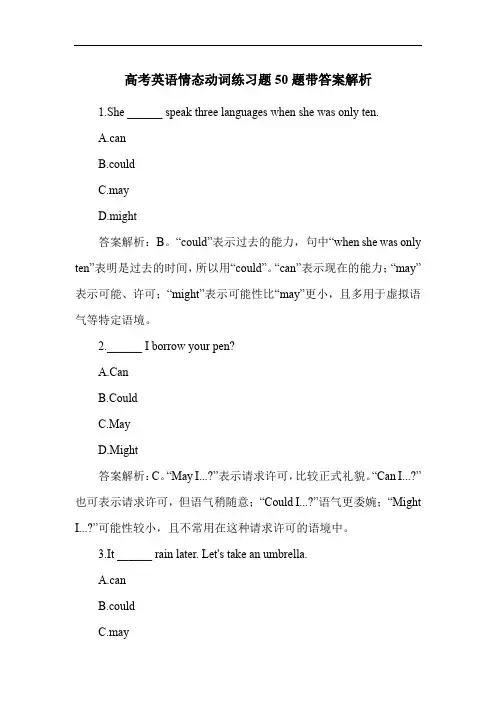
高考英语情态动词练习题50题带答案解析1.She ______ speak three languages when she was only ten.A.canB.couldC.mayD.might答案解析:B。
“could”表示过去的能力,句中“when she was only ten”表明是过去的时间,所以用“could”。
“can”表示现在的能力;“may”表示可能、许可;“might”表示可能性比“may”更小,且多用于虚拟语气等特定语境。
2.______ I borrow your pen?A.CanB.CouldC.MayD.Might答案解析:C。
“May I...?”表示请求许可,比较正式礼貌。
“Can I...?”也可表示请求许可,但语气稍随意;“Could I...?”语气更委婉;“MightI...?”可能性较小,且不常用在这种请求许可的语境中。
3.It ______ rain later. Let's take an umbrella.A.canB.couldC.mayD.might答案解析:D。
“may”和“might”都表示可能性,但“might”的可能性比“may”更小,根据“Let's take an umbrella.”可知不确定是否会下雨且可能性较小,所以用“might”。
“can”表示能力、许可或可能性,但在此语境不合适;“could”表示过去的能力或可能性,这里不是过去的情况。
4.You ______ be right, but I'm not sure.A.canB.couldC.mayD.might答案解析:C。
“may”表示有可能,句中“I'm not sure”表明不确定对方是否正确,可能性较大一些。
“can”表示能力、许可或可能性,但在此语境不合适;“could”表示过去的能力或可能性,这里不是过去的情况;“might”可能性比“may”更小。
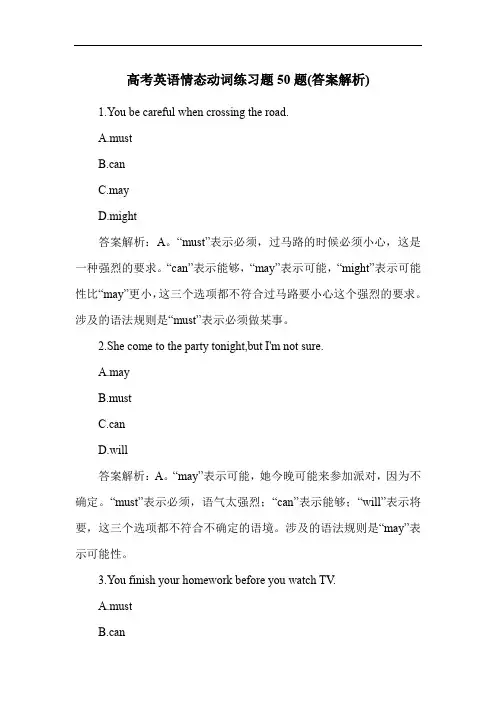
高考英语情态动词练习题50题(答案解析)1.You be careful when crossing the road.A.mustB.canC.mayD.might答案解析:A。
“must”表示必须,过马路的时候必须小心,这是一种强烈的要求。
“can”表示能够,“may”表示可能,“might”表示可能性比“may”更小,这三个选项都不符合过马路要小心这个强烈的要求。
涉及的语法规则是“must”表示必须做某事。
2.She come to the party tonight,but I'm not sure.A.mayB.mustC.canD.will答案解析:A。
“may”表示可能,她今晚可能来参加派对,因为不确定。
“must”表示必须,语气太强烈;“can”表示能够;“will”表示将要,这三个选项都不符合不确定的语境。
涉及的语法规则是“may”表示可能性。
3.You finish your homework before you watch TV.A.mustB.canC.mayD.might答案解析:A。
“must”表示必须,先完成作业才能看电视,是一种规定。
“can”表示能够,“may”表示可能,“might”表示可能性比“may”更小,这三个选项都不符合规定的语境。
涉及的语法规则是“must”用于表示必须做某事。
4.He be very tired after a long day at work.A.mustB.canC.mayD.might答案解析:A。
工作了一整天后他肯定很累,“must”表示肯定的推测。
“can”表示能够,“may”表示可能,“might”表示可能性比“may”更小,这三个选项都不如“must”的推测强烈。
涉及的语法规则是“must”表示肯定的推测。
5.We take an umbrella.It might rain later.A.mustB.canC.mayD.should答案解析:D。
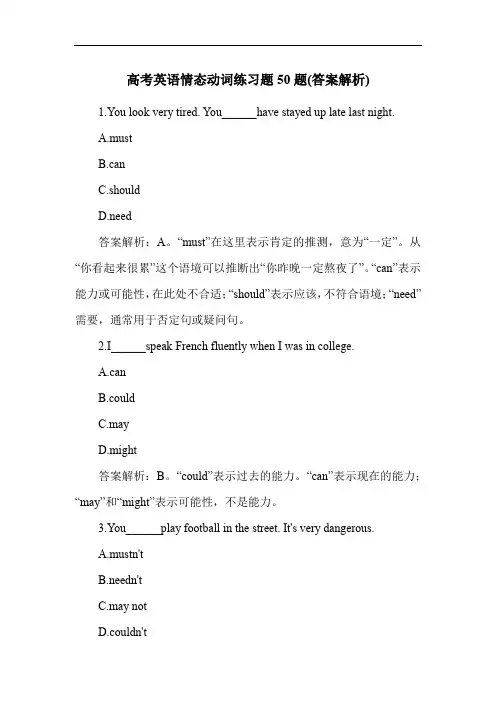
高考英语情态动词练习题50题(答案解析)1.You look very tired. You______have stayed up late last night.A.mustB.canC.shouldD.need答案解析:A。
“must”在这里表示肯定的推测,意为“一定”。
从“你看起来很累”这个语境可以推断出“你昨晚一定熬夜了”。
“can”表示能力或可能性,在此处不合适;“should”表示应该,不符合语境;“need”需要,通常用于否定句或疑问句。
2.I______speak French fluently when I was in college.A.canB.couldC.mayD.might答案解析:B。
“could”表示过去的能力。
“can”表示现在的能力;“may”和“might”表示可能性,不是能力。
3.You______play football in the street. It's very dangerous.A.mustn'tB.needn'tC.may notD.couldn't答案解析:A。
“mustn't”表示禁止,不允许在街道上踢足球,因为很危险。
“needn't”表示不必;“may not”表示可能不;“couldn't”表示过去不能。
4.______I borrow your pen?A.MayB.MustC.NeedD.Will答案解析:A。
“May I...?”表示请求许可,“我可以借你的笔吗?”“Must”表示必须,“Need”表示需要,“Will”表示将来或意愿,都不符合请求许可的语境。
5.The light is on. He______be at home.A.mustB.canC.shouldD.need答案解析:A。
“must”表示肯定的推测,灯亮着,所以他一定在家。
“can”表示能力或可能性,不太确定;“should”表示应该,不准确;“need”需要,不符合语境。

高考英语情态动词练习题20题1.You be tired after such a long journey.A.mustB.canC.couldD.may答案解析:A。
“must”在这里表示肯定的推测,“长途旅行后你一定很累”。
“can”表示能力、可能性;“could”可以表示过去的能力、委婉的请求等;“may”表示可能,语气比“must”弱。
2.In the classroom, students be quiet and listen to the teacher carefully.A.mustB.canC.shouldD.may答案解析:A。
“must”表示必须,在教室里学生必须安静并认真听老师讲课。
“can”表示能力、可能性;“should”表示应该,但语气不如“must”强烈;“may”表示可能。
3.She have forgotten her homework. She is usually very careful.A.can'tB.mustn'tC.may notD.shouldn't答案解析:C。
“may not”表示可能不,“她可能没有忘记她的作业,她通常很细心”。
“can't”表示不可能;“mustn't”表示禁止;“shouldn't”表示不应该。
4.You be joking! That can't be true.A.mustB.canC.shouldD.may答案解析:A。
“must”在这里表示肯定的推测,“你一定是在开玩笑!那不可能是真的”。
“can”表示能力、可能性;“should”表示应该;“may”表示可能,语气比“must”弱。
5.We go to the park if it is sunny tomorrow.A.canB.mayC.mustD.should答案解析:B。
“may”表示可能,“如果明天天气晴朗,我们可能去公园”。
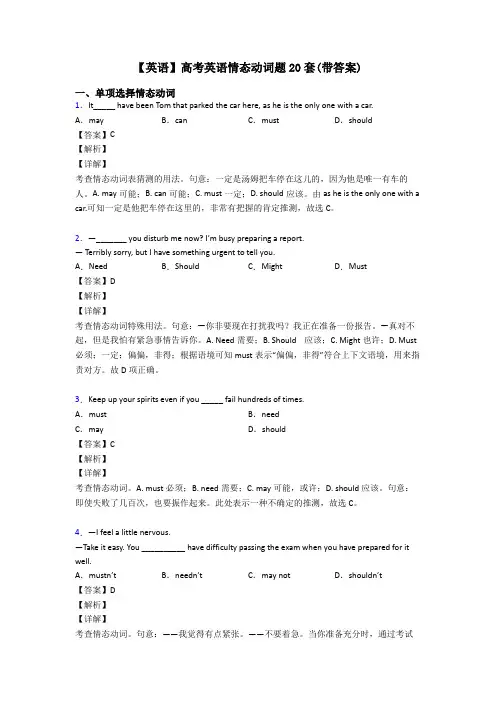
【英语】高考英语情态动词题20套(带答案)一、单项选择情态动词1.It_____ have been Tom that parked the car here, as he is the only one with a car.A.may B.can C.must D.should【答案】C【解析】【详解】考查情态动词表猜测的用法。
句意:一定是汤姆把车停在这儿的,因为他是唯一有车的人。
A. may可能;B. can可能;C. must一定;D. should应该。
由as he is the only one with a car.可知一定是他把车停在这里的,非常有把握的肯定推测,故选C。
2.—_______ you disturb me now? I’m busy preparing a report.— Terribly sorry, but I have something urgent to tell you.A.Need B.Should C.Might D.Must【答案】D【解析】【详解】考查情态动词特殊用法。
句意:—你非要现在打扰我吗?我正在准备一份报告。
—真对不起,但是我怕有紧急事情告诉你。
A. Need需要;B. Should 应该;C. Might也许;D. Must 必须;一定;偏偏,非得;根据语境可知must表示“偏偏,非得”符合上下文语境,用来指责对方。
故D项正确。
3.Keep up your spirits even if you _____ fail hundreds of times.A.must B.needC.may D.should【答案】C【解析】【详解】考查情态动词。
A. must必须;B. need需要;C. may可能,或许;D. should应该。
句意:即使失败了几百次,也要振作起来。
此处表示一种不确定的推测,故选C。
4.—I feel a little nervous.—Take it easy. You __________ have difficulty passing the exam when you have prepared for it well.A.mustn’t B.needn’t C.may not D.shouldn’t【答案】D【解析】【详解】考查情态动词。

高中情态动词专项练习200题Ⅰ.情态动词的特征:①本身有词义;②不能独立作谓语;③后接动词原形一起构成谓语;④不随人称和数的变化。
Ⅱ.情态动词各自的基本意义及用法:1.can 与could用法2.may与might用法3.must与have to用法4.need与dare用法5.should与ought to用法6.shall与will用法7.used to与would用法Ⅲ.情态动词表推测:1.大多数情态动词(除表‘能力、许可、意志’外),都可以表示推测,其程度有差异。
按可能性程度的高低排列为:must﹥will ﹥would ﹥ought to ﹥should完全肯定完全可能很可能﹥can ﹥could﹥may ﹥might可能有可能2.区分情态动词的否定含义:may not或许不、可能不might not可能不can’t 不可能mustn’t不许、禁止shouldn’t不应该needn’t 不必3.情态动词表推测具体运用:情态动词可以对现在、进行、过去推测。
4.表示反劝的特殊的表推测形式5.注意:Ⅳ.情态动词表推测的反意疑问句1.情态动词表推测的反意疑问句,简单来说,就是以情态动词后的时态为淮,如句子里有明确的时间状语,则以其为准。
2.以must 为例:e.g.: 1.You must be hungry now, aren’t you?2.He must be watching TV , isn’t he ?3.Tom must have lived her for a long time, hasn’t he ?4.She must have arrived yesterday, didn’t she?注:如选择题中(以She must have arrived yesterday, didn’t she?为例)既有didn’t she又有hasn’t she 则以didn’t she?为最佳答案。
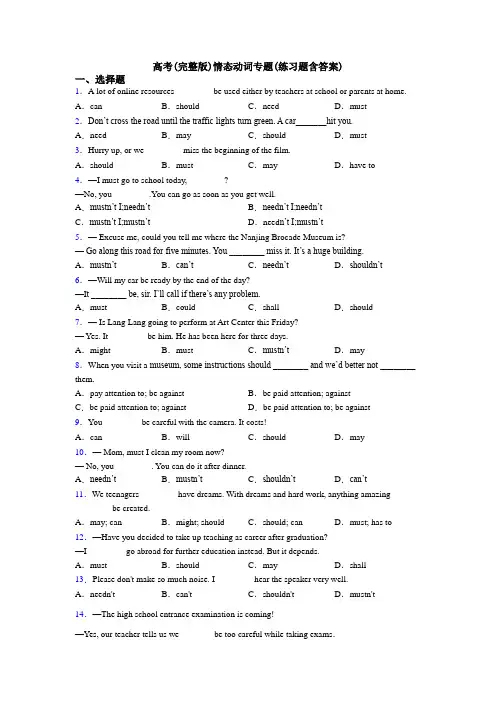
高考(完整版)情态动词专题(练习题含答案)一、选择题1.A lot of online resources ________ be used either by teachers at school or parents at home. A.can B.should C.need D.must2.Don’t cross the road until the traffic lights turn green. A car_______hit you.A.need B.may C.should D.must3.Hurry up, or we ________ miss the beginning of the film.A.should B.must C.may D.have to4.—I must go to school today, ________?—No, you ________.You can go as soon as you get well.A.mustn’t I;needn’t B.needn’t I;needn’tC.mustn’t I;mustn’t D.need n’t I;mustn’t5.— Excuse me, could you tell me where the Nanjing Brocade Museum is?—Go along this road for five minutes. You ________ miss it. It’s a huge building. A.mustn’t B.can’t C.needn’t D.shouldn’t 6.—Will my car be ready by the end of the day?—I t ________ be, sir. I’ll call if there’s any problem.A.must B.could C.shall D.should7.— Is Lang Lang going to perform at Art Center this Friday?— Yes. It ________ be him. He has been here for three days.A.might B.must C.mustn’t D.may8.When you visit a museum, some instructions should ________ and we’d better not ________ them.A.pay attention to; be against B.be paid attention; againstC.be paid attention to; against D.be paid attention to; be against9.You ________ be careful with the camera. It costs!A.can B.will C.should D.may10.— Mom, must I clean my room now?— No, you ________. You can do it after dinner.A.needn’t B.mustn’t C.shouldn’t D.can’t11.We teenagers ________ have dreams. With dreams and hard work, anything amazing________ be created.A.may; can B.might; should C.should; can D.must; has to 12.—Have you decided to take up teaching as career after graduation?—I ________ go abroad for further education instead. But it depends.A.must B.should C.may D.shall 13.Please don't make so much noise. I ________ hear the speaker very well.A.needn't B.can't C.shouldn't D.mustn't 14.—The high school entrance examination is coming!—Yes, our teacher tells us we _______ be too careful while taking exams.A.mustn't B.shouldn't C.needn't D.can't15.You ______ pay too much attention to your pronunciation, as it is so important in the oral (口头的) test.A.shouldn’t B.mustn’t C.can’t D.needn’t 16.—Would you please________in that way? That’s not safe!—Sorry. I won’t do it any more.A.not driving B.not to drive C.no driving D.not drive 17.Dr. Zhong Nanshan once said, "To prevent the spread of this disease, we________never be too careful."A.can B.may C.must D.should18.—Will your mother be at home this Saturday?—Hard to say. She _______go to the countryside to see my grandparents.A.must B.may C.can D.would19.Think twice before making a decision, or you __________ get into trouble.A.may B.can't C.shouldn't D.mustn't20.I ________ hear you clearly. Would you please repeat it?A.mustn’t B.can’t C.needn’t D.shou ldn’t 21.Look at the floor, Tom! ________ you watch TV while having a meal?A.Should B.Could C.Must D.May22.You _________ smoke here! Look at the sign. It says "No smoking".A.needn't B.mustn't C.can D.may23.— Listen! Tom ________ be listening to the music while doing his homework.—Let’s go upstairs to remind him to turn it off.A.should B.could C.would D.must24.—Will Jim come to Yangzhou for a holiday?—He ________come and it depends on how much homework he will have.A.may B.should C.must D.need25.—In China, many parents complain that their children have to stay up late to do the homework.—Don’t worry. The government has realized the problem. I’m sure there ________ be good news soon.A.can B.should C.need D.must26.I think all the students love the weekends because, to them, they ________ get up early on Saturdays or Sundays.A.mustn’t B.don’t need C.needn’t D.can’t27.When people are waiting at the zebra crossing, cars and buses ________ wait and let them go first.A.must B.may C.can D.need28.—Shall I tell him the change of the time right now?—I’m afraid you ________, otherwise he will be late for the meeting.A.can B.may C.must D.need29.It’s of great importance to protect the environment. Each of us ________ take an active part in it.A.can B.may C.would D.should 30.—Must we stop the Japanese government discharging nuclear waste water (排放核污水) into the Pacific Ocean?—________. Because everyone should protect our earth and it is bad ________ us to eat the polluted seafood and drink the waste water.A.Yes, we can; of B.No, we mustn’t; of C.Yes, we must; for D.No, we needn’t; for 31.According to the rule, used batteries ________ be dropped in the red bin for harmful wastes. A.may B.would C.should D.might32.Cars ________ give way to walkers on some roads in Binhai, or the drivers will be fined. A.may B.will C.can D.must33.Mr. Black ________ be at home now. He went abroad on vacation last Friday.A.can’t B.mustn’t C.needn’t D.shouldn’t 34.—How beautiful the winter jasmines (迎春花) are!—Yes. These golden-yellow flowers ________ be widely seen in my city in March.A.must B.can C.would D.should35.— What do you think of the show yesterday?— Some of them were really good but others ________ be better.A.will B.must C.need D.can 36.—Who’s the man over ther e? Is that Mr. Black?—It ________ be him. Mr. Black is much taller than that man.A.may B.must C.can’t D.mustn’t37.—________ I see your ID card? We have to check your personal information.—Sure. Here you are.A.May B.Need C.Should D.Must38.—I don’t care what people think.—Well, you _______ . Some opinions are worth weighing.A.should B.might C.could D.would39.—I think they are enough. We ________ make so many chairs.—I don’t think so. Because nearly a quarter of them need ________.A.don’t need to; mending B.needed; to be mendedC.don’t need; mend D.need; to mend40.—Seventy dollars for such a dress! You ________ be joking!—I’m serious. It’s made of silk from Hangzhou.A.must B.need C.will D.can【参考答案】一、选择题1.A解析:A【详解】句意:很多在线资源既可以供学校的老师使用,也可以供家长在家使用。

高中英语情态动词形式练习题40题含答案解析1.You come to the party tonight if you finish your homework.A.canB.couldC.mayD.might答案解析:A。
“can”表示有能力或有机会做某事,在这里表示如果你完成作业就有机会来参加今晚的派对。
“could”和“might”语气较委婉,“may”通常表示可能性。
在这个语境中,强调有能力和机会,用“can”最合适。
2.She pass the exam if she studies hard.A.canB.couldC.mayD.might答案解析:A。
同样,这里强调如果她努力学习就有能力通过考试,“can”表示能力。
“could”“might”语气委婉,“may”表示可能性,这里突出能力,所以选“can”。
3. you help me with this math problem?A.CanB.CouldC.May答案解析:B。
这里用“could”表示委婉地请求,“can”语气较直接,“may”和“might”在这个语境中不太符合请求的语气。
4.I ask you a question?A.CanB.CouldC.MayD.Might答案解析:C。
“may”用于请求许可比较正式,“can”也可以用于请求但相对不那么正式,“could”和“might”语气委婉但在这里不太符合直接请求的语境。
5. he come to school late today?A.CanB.CouldC.MayD.Might答案解析:D。
“might”在这里表示对可能性的较小推测,他今天有可能会迟到吗?“can”和“could”通常不用于这种较小可能性的推测,“may”也不太符合这个语境。
6. you lend me your pen?A.CanB.CouldD.Might答案解析:B。
“could”表示委婉地请求借笔,“can”语气较直接,“may”和“might”不太符合请求借东西的语境。
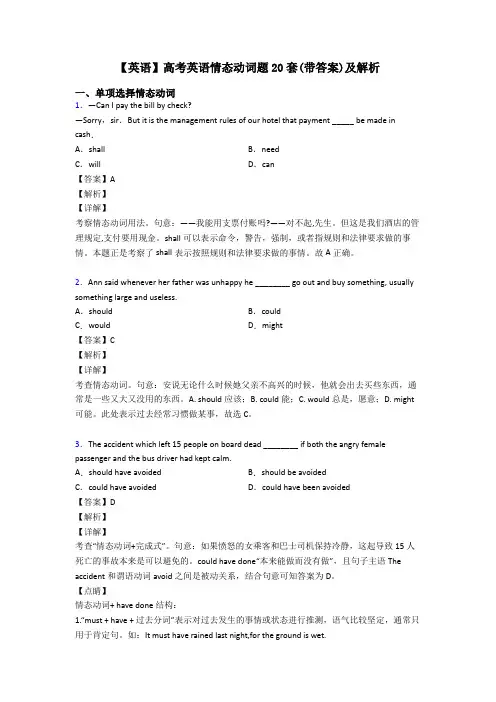
【英语】高考英语情态动词题20套(带答案)及解析一、单项选择情态动词1.—Can I pay the bill by check?—Sorry,sir.But it is the management rules of our hotel that payment _____ be made in cash.A.shall B.needC.will D.can【答案】A【解析】【详解】考察情态动词用法。
句意:——我能用支票付账吗?——对不起,先生。
但这是我们酒店的管理规定,支付要用现金。
shall可以表示命令,警告,强制,或者指规则和法律要求做的事情。
本题正是考察了shall表示按照规则和法律要求做的事情。
故A正确。
2.Ann said whenever her father was unhappy he ________ go out and buy something, usually something large and useless.A.should B.couldC.would D.might【答案】C【解析】【详解】考查情态动词。
句意:安说无论什么时候她父亲不高兴的时候,他就会出去买些东西,通常是一些又大又没用的东西。
A. should应该;B. could能;C. would总是,愿意;D. might 可能。
此处表示过去经常习惯做某事,故选C。
3.The accident which left 15 people on board dead ________ if both the angry female passenger and the bus driver had kept calm.A.should have avoided B.should be avoidedC.could have avoided D.could have been avoided【答案】D【解析】【详解】考查“情态动词+完成式”。
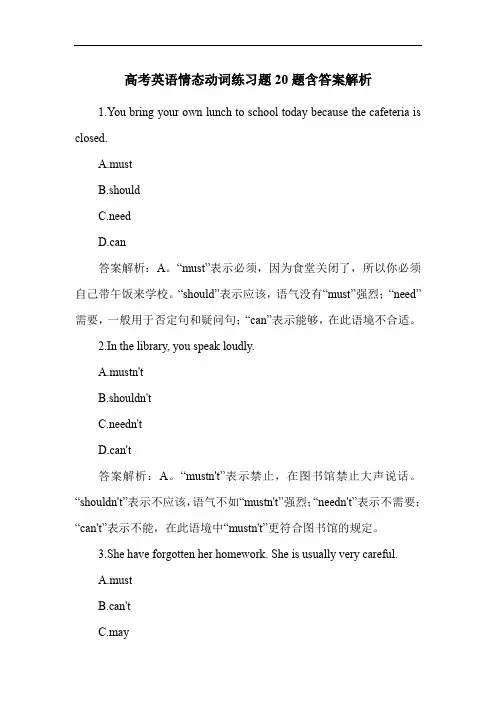
高考英语情态动词练习题20题含答案解析1.You bring your own lunch to school today because the cafeteria is closed.A.mustB.shouldC.needD.can答案解析:A。
“must”表示必须,因为食堂关闭了,所以你必须自己带午饭来学校。
“should”表示应该,语气没有“must”强烈;“need”需要,一般用于否定句和疑问句;“can”表示能够,在此语境不合适。
2.In the library, you speak loudly.A.mustn'tB.shouldn'tC.needn'tD.can't答案解析:A。
“mustn't”表示禁止,在图书馆禁止大声说话。
“shouldn't”表示不应该,语气不如“mustn't”强烈;“needn't”表示不需要;“can't”表示不能,在此语境中“mustn't”更符合图书馆的规定。
3.She have forgotten her homework. She is usually very careful.A.mustB.can'tC.may答案解析:C。
“may”表示可能,她通常很细心,但是这次有可能忘记了作业。
“must”表示一定,语气太肯定;“can't”表示不可能,与后面的“usually very careful”不太符合;“should”表示应该,不符合语境。
4.We go to the park if it doesn't rain tomorrow.A.canB.mustC.shouldD.need答案解析:A。
“can”表示能够,如果明天不下雨我们能够去公园。
“must”表示必须,语气不合适;“should”表示应该;“need”表示需要,都不符合语境。
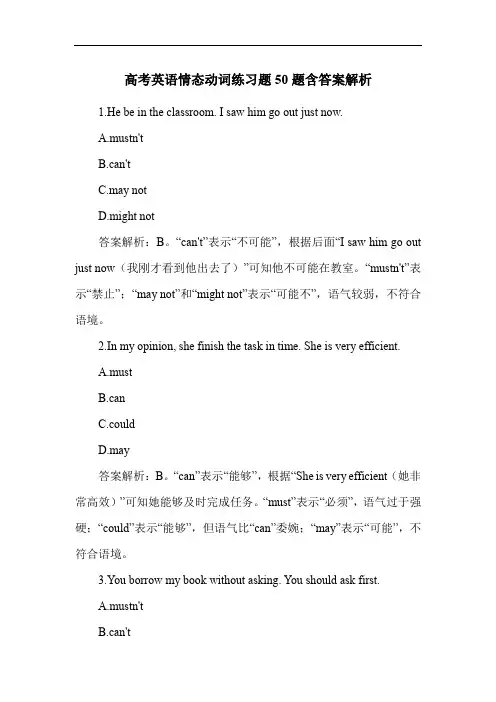
高考英语情态动词练习题50题含答案解析1.He be in the classroom. I saw him go out just now.A.mustn'tB.can'tC.may notD.might not答案解析:B。
“can't”表示“不可能”,根据后面“I saw him go out just now(我刚才看到他出去了)”可知他不可能在教室。
“mustn't”表示“禁止”;“may not”和“might not”表示“可能不”,语气较弱,不符合语境。
2.In my opinion, she finish the task in time. She is very efficient.A.mustB.canC.couldD.may答案解析:B。
“can”表示“能够”,根据“She is very efficient((她非常高效)”可知她能够及时完成任务。
“must”表示“必须”,语气过于强硬;“could”表示“能够”,但语气比“can”委婉;“may”表示“可能”,不符合语境。
3.You borrow my book without asking. You should ask first.A.mustn'tB.can'tC.may notD.might not答案解析:A。
“mustn't”表示“禁止”,没有经过询问禁止借我的书。
“can't”表示“不可能”;“may not”和“might not”表示“可能不”,均不符合语境。
4. he come to the party tonight? I'm not sure.A.MustB.CanC.CouldD.May答案解析:D。
“may”表示“可能”,后面回答“I'm not sure((我不确定)”符合语境。
“must”表示“必须”;“can”表示“能够”;“could”表示“能够”,语气比“can”委婉,均不符合语境。
高考英语情态动词练习题50题带答案1.You stay at home if it rains tomorrow.A.mustB.shouldC.mayD.have to答案解析:C。
“may”表示“可能,可以”,符合语境。
“must”表示“必须”,语气过于强硬;“should”表示“应该”,不太符合该语境;“have to”表示“不得不”,通常是客观条件所迫,而此处只是一种可能性,所以选C。
2.He be very tired after such a long journey.A.mustB.shouldC.canD.need答案解析:A。
“must”在这里表示肯定的推测,“长途旅行后他一定很累”。
“should”表示“应该”;“can”表示“能够”;“need”表示“需要”,均不符合语境,所以选A。
3.We go to the park if the weather is fine.A.canB.mayC.mustD.need答案解析:B。
“may”表示“可能”,天气好的话我们可能去公园,比较符合常理。
“can”表示“能够”;“must”表示“必须”;“need”表示“需要”,这三个选项都不太符合语境,所以选B。
4.She know the answer,but she's not sure.A.mustB.mayC.shouldD.can答案解析:B。
“may”表示“可能”,她可能知道答案但不确定。
“must”表示肯定的推测,与“not sure”矛盾;“should”表示“应该”;“can”表示“能够”,均不符合语境,所以选B。
5.You finish your homework before you watch TV.A.mustB.shouldC.canD.may答案解析:A。
“must”表示“必须”,先完成作业才能看电视。
“should”表示“应该”,语气不如“must”强烈;“can”表示“能够”;“may”表示“可以”,这三个选项都不符合语境,所以选A。
情态动词专项训练1. —That must be a mistake.—No, it ________ be a mistake.A. mustn’tB. needn’tC. can’tD. wouldn’t2. —Summer Holiday is drawing near. Are you going home for the holiday?—I haven’t decided yet. I ________ go hom e, but it depends on the weather.A. mustB. needC. mayD. will3. — ________ the plane have taken off on time?—I’m afraid not. The fog was too thick then.A. WouldB. WillC. MustD. Can4. By the time we got there, they had already finished the work, so we ________ there.A. needn’t goB. needn’t have goneC. didn’t need to goD. shouldn’t go5. —How about Rose? She asked for sick leave yesterday.—You ________ worry about her; she ________ well already.A. needn’t; may getB. don’t ne ed to; may getC. mustn’t; getsD. needn’t; may have got6. I learned nothing in the class. I ________ stay at home.A. mightB. mayC. might as wellD. may not7. — ________ you shout so loudly?—Of course, after I gave her my advice, she ________ go and do the opposite.A. Can; shouldB. Need; mustC. Must; mustD. Need; can8. —Must I finish the work this afternoon?—No. you ________.A. mustn’tB. might notC. don’t have toD. can’t9. He is such a kind-hearted person. On Sundays he ________ go to call in the old man when he was young.A. wouldB. shouldC. used toD. could10. —But this is my first time in the new airport.—Don’t worry. I ________ be at the airport to meet you.A. shouldB. shallC. mayD. can11. —How did you do on the test?—Not so well. I ________ much better but I misread the directions for Part DA. could doB. could have doneC. must have doneD. should12. This couple had been separated for twenty years, you ________ imagine how happy they were when they met again.A. mightB. willC. canD. must13. —They haven’t finished the work up to now.—Well, they ________A. should haveB. shouldC. ought to have finishedD. ought have14. She ________ listen to records, alone in her ro om for hours. We just won’t interrupt her, for we know this is her usual way to stay in peace.A. mightB. mustC. willD. should15. — Well done, Tom!— Thanks, but given me more time, I ________ it much better.A. shouldn’t have doneB. should have doneC. might not doD. could have done【答案与简析】1. C表示有把握的否定推测用can’t(不可能)。
高三英语情态动词专项训练100(附答案)含解析一、单项选择情态动词1.It wasn’t right to me that such near neighbors not know one another.A.could B.wouldC.should D.might【答案】C【解析】【详解】考查情态动词。
句意:对我来说,很不正常,如此近的邻居居然不认识。
A. could可能,能够;B. would将;C. should竟然;D. might可能,也许。
should 作为情态动词,可以用来表示意外、惊喜或者在说话人看来是不可思议的,常常译为"竟会"、"居然",住的这么近的邻居居然不认识。
表示意外,所以答案选C。
【点睛】should的用法1、should 作为情态动词,通常用来表示现在或将来的责任或义务,译作“应该”、“应当”,这时它可以和 ought to, be supposed to 互换使用.例如:You should (= ought to ) tell your mother about it at once.2、should 作为情态动词,可以用在条件状语从句中,表示语气较强的假设,译作“万一”、“竟然”,这时也可将 should 置于从句之首,即将 should 放在主语前面,而省略从属连词 if。
例如:If you should fail to come, ask Mrs Chen to work in your place. (= Should you fail to come, ask Mrs Chen to work in your place. )3、should 作为情态动词,可以表示谦逊、客气、委婉之意,译为“可……”、“倒……”。
例如:I should say that it would be better to try it again.4、should 作为情态动词,可以用来表示意外、惊喜或者在说话人看来是不可思议的.尤其在以 why, who, how 等开头的修辞疑问句或某些感叹句中常常译为“竟会”、“居然”。
高考情态动词练习20题1. Tom be at home. I just saw him go out.A.mustn'tB.can'tC.needn'tD.shouldn't答案解析:B。
“can't”表示“不可能”,符合语境,因为刚刚看到汤姆出去了,所以他不可能在家。
“mustn't”表示“禁止”;“needn't”表示“不必”;“shouldn't”表示“不应该”,这三个选项都不符合题意。
2. You have finished your homework before you watch TV.A.mustB.canC.mayD.need答案解析:A。
“must”表示“必须”,符合题意,即你必须先完成作业才能看电视。
“can”表示“能够”;“may”表示“可以”;“need”表示“需要”,这三个选项都不能准确表达该语境下的义务。
3. She speak three languages fluently.A.mustB.canC.shouldD.need答案解析:B。
“can”表示“能够”,在这里表示她能够流利地说三种语言。
“must”表示“必须”,不符合语境;“should”表示“应该”;“need”表示“需要”,这两个选项也不合适。
4. I be wrong, but I think he is from Canada.A.mayB.mustC.shouldD.need答案解析:A。
“may”表示“可能”,符合语境,即我可能是错的。
“must”表示“一定”,语气太肯定;“should”表示“应该”;“need”表示“需要”,都不符合该语境。
5. You go to school on foot. It's not far.A.mustB.canC.shouldD.need答案解析:B。
“can”表示“可以”,在这里表示你可以步行去上学,因为不远。
高考英语情态动词练习题50题含答案解析1.You look very tired. You ______ have stayed up late last night.A.mustB.canC.shouldD.need答案解析:A。
must 表示肯定的推测,“一定”;can 表示可能性,“可能”,语气没有must 强烈;should 表示“应该”,不是推测;need 表示“需要”,也不是推测。
在这个场景中,看起来很累,很有可能是昨晚熬夜了,用must 表示比较肯定的推测。
2.The ground is wet. It ______ have rained last night.A.mustB.canC.shouldD.need答案解析:A。
must 表示肯定的推测,地面湿了,很有可能是昨晚下雨了,所以用must;can 表示可能性,语气较弱;should 表示“应该”,不是推测;need 表示“需要”,也不是推测。
3.There is no one in the classroom. The students ______ be having a PE class.A.mustB.canD.need答案解析:A。
must 表示肯定的推测,教室里没人,很有可能是学生们在上体育课,用must;can 表示可能性,语气较弱;should 表示“应该”,不是推测;need 表示“需要”,也不是推测。
4.The book is not here. It ______ be taken by someone.A.mustB.canC.shouldD.need答案解析:A。
must 表示肯定的推测,书不在这儿,很有可能是被人拿走了,用must;can 表示可能性,语气较弱;should 表示“应该”,不是推测;need 表示“需要”,也不是推测。
5.The light is on. She ______ be at home.A.mustB.canC.shouldD.need答案解析:A。
高考英语情态动词练习题50题(带答案)1. You ______ be tired after working for eight hours without a break.A. canB. mayC. mustD. should答案解析:C。
must表示肯定的推测,根据题意,连续工作八小时不休息肯定会累,所以这里用must。
A选项can表示能力或可能性,通常用于否定句和疑问句中表示推测,这里不符合语境。
B选项may表示可能,可能性较弱,没有must肯定。
D选项should表示应该,与题意推测累不累不相关。
2. - ______ I use your pen? - Sure. Here you are.A. MustB. MayC. NeedD. Should答案解析:B。
May用于征求对方许可,在这个句子中是询问是否可以使用对方的笔,符合语境。
A选项Must表示必须,C选项Need 表示需要,D选项Should表示应该,都不符合这个征求许可的语境。
3. He ______ speak English when he was five years old.A. couldB. canC. mayD. must答案解析:A。
could是can的过去式,表示过去的能力,句中提到他五岁的时候,是过去的时间,所以用could表示过去能说英语。
B选项can表示现在的能力。
C选项may表示可能,D选项must表示肯定的推测,都不符合这里表示过去能力的语境。
4. - Where is Tom? - He ______ be in the library. I'm not sure.A. canB. mayC. mustD. should答案解析:B。
may表示可能性,根据I'm not sure可知说话者不确定,只是一种可能,所以用may。
A选项can用于否定句和疑问句中表示推测,这里是肯定句。
高考英语《情态动词》专项练习(含答案)第一节交际1.表示“请求”,请别人做事。
用will, would, can , could。
句型:1)Will / Would you(please)do …?(2)Can / Could you do … ?在这两个句型中would, could比will, can更正式、客气。
Will / Would you please explain the text once again ?Can / Could you tell me what time Flight 312 arrives?2.询问是否“许可”。
用can / could,may / might句型:(1)May / Might I do … ? (2)Can / Could I do…?在这两个句型中could, might比can, may更正式、客气。
— Could I use your car ?— Yes, of course, you can ?(回答必须用can)— Might I have a look at your new computer ?— Yes, you may(回答必须用may)或Please go ahead.3.自己想做,要求对方做决定, 即征询对方意见。
用shall,用于第一人称和第三人称。
句型:Shall I(we, he, she it, they)…?译“要不要…?”— The room is so dirty. Shall we clean it?— Of course. (03全国春季)Shall these goods be sent over to you at once ? 要不要把这些货物马上送给你?4.表示规劝,建议1)正面的规劝,表示“最好”,“应该”,或“必须”做某事。
①表示“最好”,用had better,may / might as well或It is better / best to do sth.You might just as well tell the manufacturer that male customers may not like the design of the furniture.If you are planning to spend your money having fun this week, betterforget it—you’ve got some big bills coming.(04广东卷)(better forget it相当于You had better forget it.)②表示“有义务或有必要”,用should或ought to。
即“应该”。
If you see anything unusual, you should call the police.③用must 译:“必须”。
The guide required that all passengers must wear seat belts.导游要求所有旅客必须系安全带。
2)反面的规劝,表示“不必”,“不应当”,或“不许”做某事。
①表示“不必”,用needn’t 或don’t have to 。
--- I don't mind telling you what I know.--- You needn’t. I'm not asking you for it. (04江苏卷)Y ou needn’t return / don’t have to return the book now. You can keep it till next week.②表示“不应该”,用shouldn’t或oughtn’t to。
W e shouldn’t throw cold water on them. 我们不应当给他们泼冷水。
③表示“不许”,用mustn’t。
You mustn’t smoke in cl ass. 上课时不准吸烟。
needn’t / don’t have to →shouldn’t →mustn’t 语气逐步加强5.须区别或注意的情态动词1)can, could与be able to的区别a)表示能力时can和be able to可以互换使用I can / am able to speak English. She could / was able to read novels at ten.b)表示在过去某一特定场合下,一次性表现出来的能力,只能用was / were able to。
The fire spread through the hotel very quickly but everyone get out.A.had to B.would C.could D.was able to(答案D)2)shall用在主语是第二、第三人称的陈述句中,表示说话人给对方的许诺或命令。
Work hard and you shall be paid. 好好干,你会得到报酬的。
(许诺)You shall leave here at once. = You must leave here at once. (命令)shall也用于法律、法令或规章等正式文件中,表示义务或规定。
译“应,必须”。
The fine shall be paid in cash. 罚款应以现金交纳。
3)need和dare的用法。
改错:1)To become a member of this club, one need attend three meeting and pay his fees regularly.2)We do need masses of young people who dare accept all kinds of challenges.a)need(需要),dare(敢于)可作行为动词用,句型need to do, dare to do。
也可作情态动词,但不能用在肯定句。
在肯定句中只能作行为动词使用,故第一题B错,need → needs to;第二题C错,accept → to acceptb)need,作情态动词用时,无人称变化。
need用于否定句和疑问句中;dare 用于否定句、疑问句和条件句中。
Y ou needn’t work so hard. →You don’t need to work so hard.— Need I go at once.—Yes, you must. / No, you needn’t.Mary dare not touch the snake. →Mary doesn’t dare(to)touch the snake.Dare you walk through the forest at night ?If the enemy dare enter our country, we will fight against them to the end.如果敌人胆敢进入我国,我们就和他们战斗到底。
4)should的用法。
should除表示“应该”外,还可用于表示情感、意志等句中的that从句。
译“竟然、居然”。
例如:You can’t imagine that a well-behaved gentleman _____ be so rude to a lady.A. mightB. needC. shouldD. would (答案C)第二节推测1.根据某一事实、现象推测可能发生的情况。
用must, may, might。
下表比较了三者表示推测肯定程度的差别,以及对不同情况推测的表达方式。
例:You must be tired. Go home and have a good rest. (对目前的推测) The light is on in the lab. Mr Li must still be doing experiments. (对目前的推测)Sorry I'm late. I might have turned off the alarm clock and gone back to sleep again.(对过去的推测)(2000北京春季)注:1)must表示推测仅用于对当前和已发生的情况,不能用于推测将来可能发生的事情。
must表示推测仅用于肯定句。
在否定句和疑问句中,必须用can / could取代must。
Mr Li can’t still be doing experiments at present.My English-Chinese dictionary has disappeared.Who ___________ have taken it?A.should B.must C.could D.would 答案C 2)may / might可以用于推测将来可能发生的情况,既可用于肯定句,也可用于否定句,但不能用于疑问句。
在疑问句中,同样使用can / could。
例:1. —Is John coming by train?— He should, but he________not. He likes driving his car.A. mustB. canC. needD. may 答案D (02全国)2. — Your son may return to Nanjing tomorrow by way of Hong Kong.— Wonderful! But how can he come, by air or sea?2.根据经验或惯例对某一情况进行推测,用should或ought to,常译成“按理应该…”或“可能会……”。
I t’s nearly seven o’clock. Jack should be here at an y moment. 时间已将近7点了,按理Jack该回来了。
第三节1.表示“当时本应该做,而实际上没有做”,用:①should have done或ought to have done②could have done或might have done句型①责备的语气强于句型②例:1. Mr. White should have arrived at 8:30 for the meeting, but he didn’t’ show up.2.He might have given you more help, even though he was busy. 2.表示“当时没有必要”做某事①needn’t have done当时做了某事,但事实上没有必要Y ou needn’t have told him the news; he knew it already.didn’t have to do通常指当时某事没有必要做且没有做。